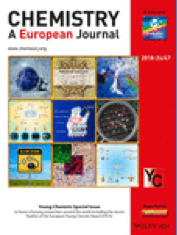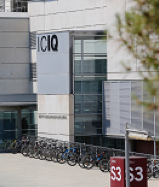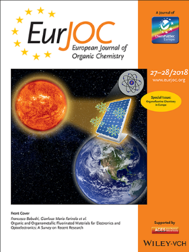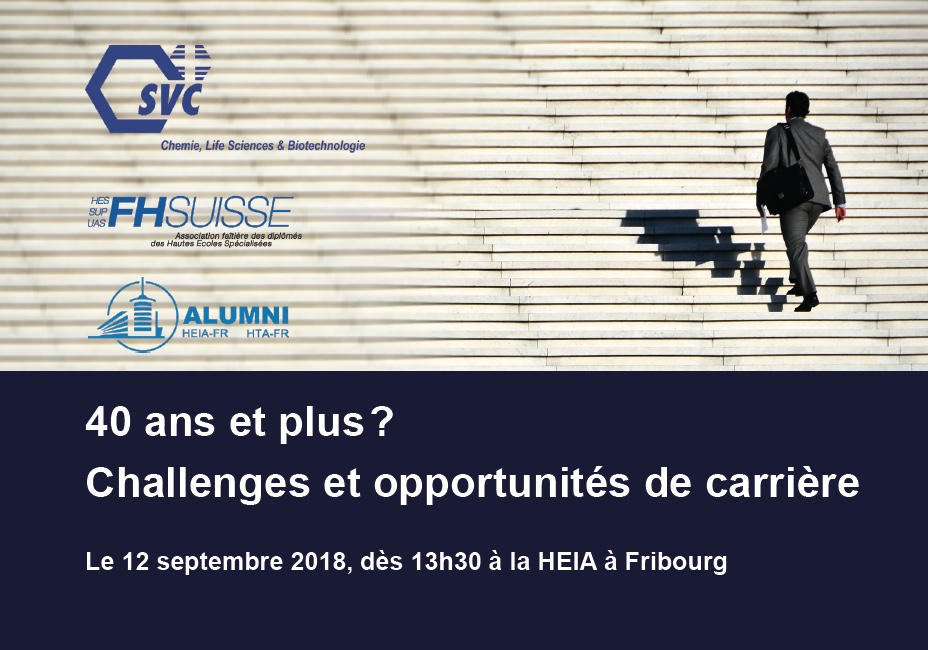ChemPubSoc Europe News, August 2018
 Chemistry – A European Journal: Young Chemists Special Issue
Chemistry – A European Journal: Young Chemists Special Issue
Guest-edited by Bruno Pignataro, this second edition of the Young Chemists Special Issuehas been assembled to honor not only the participants of the European Young Chemist Award (EYCA), presented at the 2014 and 2016 EuCheMS Congresses, but also young and emerging scientists from all different fields of chemistry around the world. Enjoy free access until the end of September 2018.
 EurJIC and EurJOC: Highlighting the ICIQ in Our New Series: European Institute Feature
EurJIC and EurJOC: Highlighting the ICIQ in Our New Series: European Institute Feature
EurJIC and EurJOC are introducing European Institute Features! As the first top European institute in this series, the journals are highlighting the Institute of Chemical Research of Catalonia (ICIQ) in Tarragona, Spain, in a joint virtual issue. This issue brings you a collection of high‐quality articles, representative of the excellent research performed at the institute. It is rounded by a Guest Editorial written by the director of the institute, Miquel A. Pericàs, who gives a brief history of the ICIQ and its development over the years.
 European Journal of Organic Chemistry: Special Issue on Organofluorine Chemistry in Europe
European Journal of Organic Chemistry: Special Issue on Organofluorine Chemistry in Europe
As part of the ongoing 20th anniversary celebrations, EurJOC is highlighting outstanding work by European researchers. This Special Issue is dedicated to Organofluorine Chemistry in Europe and showcases the state of the art in this field. With contributions from: Gianluca Maria Farinola, Graham Pattison, Thierry Billard, and Ryan Gilmour and many more. Enjoy free access until the end of 2018!
David Spichiger, SCS
31.08.2018
SCS Fall Meeting: Session Programs are online
September 7, 2018, EPFL Lausanne
https://scg.ch/fallmeeting/2018
The detailed program is online available for registered participants!
As SCS member, registration is free of charge and after the login you can
a) browse through the session programs incl. links to the abstracts and/or
b) download all talk or poster abstracts per session
Don't forget to bring your SCS member card with you when attending the Fall Meeting on September 7!
Program Overview, September 7, 2018
| 09.00 | Registration / Welcome Coffee | CE |
| 09.45 | Welcome and conference opening Prof. Sandrine Gerber, Chair SCS Fall Meeting Prof. Lyndon Emsley, ISIC Director, EPFL Lausanne |
CE 6 |
| 09.50 | Sandmeyer Award Lecture 2018 Raymonde Fonné-Pfister, Alain De Mesmaeker, Syngenta Crop Protection AG «A new generation of agrochemicals: design, synthesis and biological evaluation of stigolactone- and strigolactam derivatives for potential crop enhancement applications in modern agriculture» |
CE 6 |
| 10.20 | SISF-SCS Distinguished Investigator Award Lecture 2018 Paul W. Manley, Novartis Pharmaceuticals AG, Basel «Synthesis and Characterisation of Some Metabolites of Anti-Leukemia Drugs» |
CE 6 |
| 10.50 | Short break | |
| 11.00 | Morning Parallel Session - Analytical Sciences (AS) - Catalysis Science & Engineering (CE) - Computational Chemistry (CC) - Inorganic & Coordination Chemistry (IC) - Medicinal Chemistry & Chemical Biology (MC) - Organic Chemistry (OC) - Physical Chemistry (PC) - Polymers, Colloids & Interfaces (PCI) |
CE 5 CE 2 CE 105 CE 6 CE 3 CE 1 CE 4 BS 160 |
| 12.45 | Lunch and Poster Session Commercial Exhibition |
CE / BS |
| 13.15 | General Assembly of the Swiss Young Chemists' Association (SYCA) | CE 5 |
| 15.00 | Afternoon Parallel Session - Analytical Sciences (AS) - Catalysis Science & Engineering (CE) - Computational Chemistry (CC) - Inorganic & Coordination Chemistry (IC) - Medicinal Chemistry & Chemical Biology (MC) - Organic Chemistry (OC) - Physical Chemistry (PC) - Polymers, Colloids & Interfaces (PCI) |
CE 5 CE 2 CE 105 CE 6 CE 3 CE 1 CE 4 BS 160 |
| 15.30 | Exhibitor Apéro | near SPO |
| 16.45 | Break and coffee / refreshments | CE |
| 17.00 | SISF-SCS Senior Industrial Science Award Lecture 2018 Clemens Lamberth, Syngenta Crop Protection AG «Episodes from the Continuous Search for Solutions against Downy Mildew Diseases» |
CE 6 |
| 17.30 | Paracelsus Award Lecture 2018 Prof. Ruedi Aebersold, ETH Zurich «Mass spectrometric exploration of the biochemical basis of living systems» |
CE 6 |
| 18.15 | Best Oral Presentation Awards (sponsored by Metrohm) The prizes are handed over by Patrick Hunziker, Vice-President and Head Development, Metrohm Herisau |
CE 6 |
| 18.15 | Best Poster Presentation Awards (sponsored by DSM) The prizes are handed over by Thomas Netscher and Werner Bonrath, Senior Scientists at DSM Nutritional Products |
CE 6 |
| 18.45 | End of the conference |
David Spichiger, SCS
15.08.2018
Invitation – carrière des quadras et plus le 12.09.2018 à la HEIA-FR
Nous avons le plaisir de vous inviter à l’événement ci-dessous organisé par la SVC (association des chimistes diplômés HES), l’alumni de la HEIA-FR et FH SUISSE :
40 ans et plus ? Challenges et opportunités de carrière
Le 12 septembre 2018, dès 13h30 à la HEIA de Fribourg
Dotés d’une grande expérience professionnelle, les quadras entament la deuxième partie de leur carrière. Comme l’appréhender ? Quelle place ont-ils dans le monde du travail ?
Exposés, ateliers et débat sont au programme pour approfondir le thème.
Ci-joint, voici un flyer du programme complet. L’événement est gratuit et aura lieu en français.
> Infos et inscriptions sur www.fhschweiz.ch/svc
Nous vous souhaitons un bel été.
Cordialement
Yves Santa Eugenia
Président Association suisse des diplômés HES en Chimie
David Spichiger, SCG
15.08.2018
Open position at HEIA Fribourg: Ass. Prof. FH für chemische Verfahrensforschung und -entwicklung

Die Hochschule für Technik und Architektur Freiburg (HTA-FR) schreibt für den Studiengang Chemie, zur Ergänzung seines Teams in der Lehre und Forschung, folgende Stelle aus:
Assoziierte/r Professor/in FH für chemische Verfahrensforschung und -entwicklung
Aufgaben und Tätigkeitsgebiete
- Unterricht (Theorie und Praxis) in Verfahrenstechnik und industrieller Chemie auf Bachelor- und Masterstufe
- Aktivitäten in angewandter Forschung und Entwicklung im Bereich Prozessintensivierung und Scale-up (Feinchemikalien, Polymere, Life Sciences)
Ihr Profil
- Doktorat in Chemie und Expertise in chemischer Verfahrensforschung und-entwicklung oder gleichwertige Ausbildung
- Kompetenzen in Ausbildung und Didaktik
- Fundierte mehrjährige berufliche Erfahrung im Bereich der industriellen Chemie (Kilolabor/Produktion)
- Erfahrung in Akquisition und Durchführung von Forschungsprojekten (aF&E)
- Fähigkeit in einem dynamischen motivierten Team zu arbeiten und fachliche Kontakte zu pflegen
- Beherrschen der deutschen oder französischen Sprache mit guten Kenntnissen der anderen Sprache sowie des Englischen
Zusatzinformationen
- Die HTA-FR vertritt eine Anstellungspolitik der Chancengleichheit
- Auskünfte: Dr. Pierre Brodard, Leiter des Studiengangs Chemie,Tel.: 026 429 67 19
- Stellenantritt: 1. Februar 2019 oder nach Vereinbarung
- Bewerbungsfrist: 30. September 2018
Bitte senden Sie Ihre Bewerbungsunterlagen an:
Hochschule für Technik und Architektur Freiburg
Personaldienst
Bd Pérolles 80
1700 Freiburg
![]()
David Spichiger, SCS
02.08.2018
EuChemS Chemistry in Europe Newsletter 2018/3
The newsletter includes a number of interesting and highly relevant contributions, news, and upcoming events.
You will find an editorial by Saskia van der Vies, Member of the Executive Board, an analysis on how policymakers can best access and manage scientific advice, input from the European Young Chemists’ Network and the Professional Networks, as well as a short interview with the three awardees of the EuChemS Award for Service.
Online Version:
http://www.euchems.eu/newsletters/chemistry-in-europe-2018-3/
EuChemS Secretariat, Brussels
25.07.2018
Page 79 of 299

